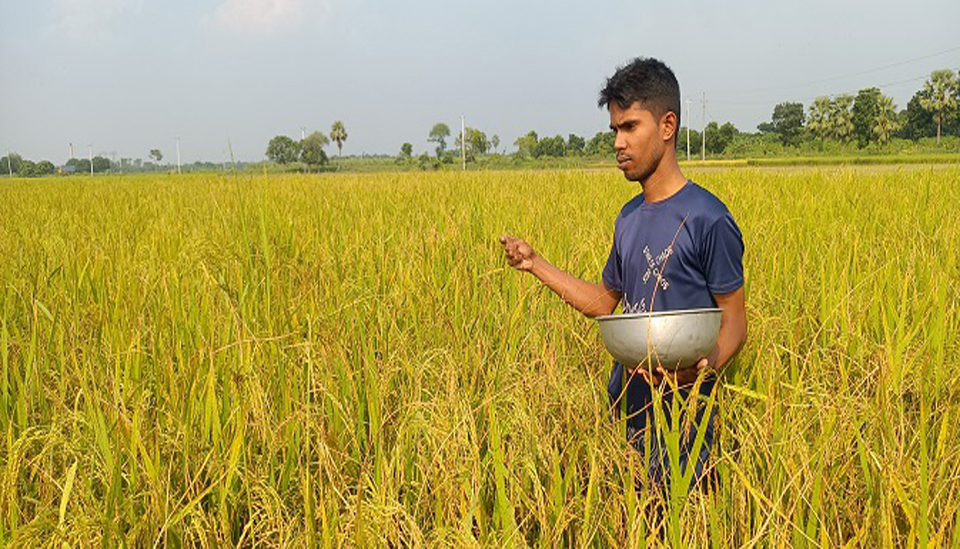
RAJSHAHI, Nov 19, 2022 (BSS) - Prospect of direct-seeded mustard farming is very bright as the method has opened up new doors of boosting mustard yields in the region, including its vast Barind tract, for the last couple of years.
In the method, farmers' sowed mustard seeds on the aman paddy fields just 10 to 12 days before its harvest so that the seeds can be germinated with soil moisture and residual effects of the paddy properly.
Enthusiastic farmers are seen humming towards adopting the method with hope of attaining more benefits as they are getting suggestions from the field-level officials of the Department of Agriculture Extension (DAE).
Shahab Uddin, 45, a farmer of Dhamila village under Godagari upazila in the district, has already sowed seed on his aman paddy field this season.
Talking to BSS at his field on Friday afternoon, he said the direct-seeded method saves cost for land preparation as well as time. It's also helpful for timely harvest which is important for going to the next crop of Boro paddy.
Sub Assistant Agriculture Officer Atanu Sarker told BSS that many of the farmers are adopting the method. They witness the germinated forms and vegetative growth of mustard plants during the time of harvesting the aman paddy.
He said mustard is being cultivated on around 250 bigha of land in the method in his working area of Iswaripur block this year.
Sarker said they are extending need-based technological suggestions to the farmers so that they can harvest their crop and transplant boro paddy seedlings timely.
Illustrating the salient feature of direct-seeded mustard, Dr Jagadish Chandra Barman, Principal Scientific Officer of Bangladesh Agriculture Research Institute, said the method is one of the significant efforts of promoting conservation agriculture (CA) based technologies.
Time has come to wide-ranging and sustainable expansion and promotion of the technologies in the drought-prone Barind tract to protect its soil health from further degradation.
Dr Barman said principles of conservation agriculture are: the use of reduced tillage, retention of some amounts of residues on the field, optimum use of natural resources, sustainable and profitable crop diversification and its rotation and judicious use of fertilisers and pesticides.
He said conservation agriculture practices could be an effective means of utilising the minimum amount of water for crop establishment in the present context of climate change, especially unpredictable rainfall and unusual drought.
Some proven benefits of the conservation agriculture-based machinery such as power tiller operated seeder (PTOS) and bed former or planters included early planting, increased yields, reduced production costs and water requirement and helped improve the environment by reducing the greenhouse gas emissions.
Meanwhile, the DAE has set the target to produce around 3.71 lakh tonnes of mustard seed from 2.48 lakh hectares of land in eight districts under Rajshahi division during the current Rabi season.
DAE Additional Director Shamsul Wadud said they are working to boost production of mustard seed to meet the local demand along with lessening the gradually mounting pressure on import of the edible oil.
He opined that there is an immense prospect of boosting production of the oilseed after the best uses of modern varieties and technologies in the region.
Utmost emphasis has been given on expanding the high yielding varieties and modern technologies to the farmers so that they can avail scopes of boosting production after deriving total benefits of those, he added.
DASCOH Foundation, an NGO, on behalf of its Integrated Water Resource Management (IWRM) Project, has been working for promoting various less-water consuming crops like mustard supported by Switzerland.
Jahangir Alam Khan, coordinator of the project, said mustard seed is a water-saving crop and its expansion in the Barind area is very important towards lessening the gradually mounting pressure on its underground water.
In the previous season, over 3.07 lakh tonnes of mustard seeds were produced from 2.13 lakh hectares of land in the division.